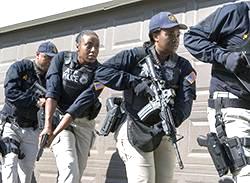 New York Times
Editorial Board
New York Times
Editorial Board
If your Internet service goes down and you call a technician, can you be certain that the person who arrives at your door is actually there to restore service? What if he is a law enforcement agent in disguise who has disabled the service so he can enter your home to look around for evidence of a crime?
Americans should not have to worry about scenarios like this, but F.B.I. agents used this ruse during a gambling investigation in Las Vegas in July. Most disturbing of all, the Justice Department is now defending the agents’ actions in court.
During the 2014 World Cup, the agents suspected that an illegal gambling ring was operating out of several hotel rooms at Caesar’s Palace in Las Vegas, but they apparently did not have enough evidence to get a court-issued warrant. So they enlisted the hotel’s assistance in shutting off the Internet to those rooms, prompting the rooms’ occupants to call for help. Undercover agents disguised as repairmen appeared at the door, and the occupants let them in. While pretending to fix the service, the agents saw men watching soccer matches and looking at betting odds on their computers.
There is nothing illegal about visiting sports-betting websites, but the agents relied primarily on that evidence to get their search warrant. What they failed to tell the judge was that they had turned off the Internet service themselves.
Of course, law enforcement authorities regularly rely on sting operations and other deceptive tactics, and courts usually allow them if the authorities reasonably believe they will find evidence of a crime. Without that suspicion, the Constitution prohibits warrantless searches of peoples’ residences, including hotel rooms. The authorities can jump that hurdle if a home’s occupant consents to let them enter, as when an undercover officer is invited into a home to buy drugs.
The Las Vegas case fails on both counts, according to a lawyer for the defendants. Although one of the defendants in the case, Wei Seng Phua, a Malaysian citizen, had been arrested in Macau earlier this year for running an illegal sports-gambling business, the agents did not have probable cause to believe anything illegal was happening in two of the rooms they searched. And a federal prosecutor had initially warned the agents not to use trickery because of the “consent issue.” In fact, a previous ruse by the agents had failed when a person in one of the rooms refused to let them in.
To read more click here.





